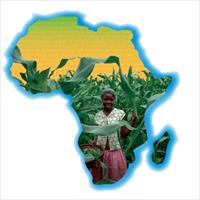Bill & Melinda Gates Foundation, Partners Pledge $90 Million to Boost Incomes of Small Farmers in Africa

Private industry joins efforts to support hundreds of thousands of cocoa, cashew farmers through improved training, access to markets
The Bill & Melinda Gates Foundation today announced two significant partnerships and $48 million in grants to help hundreds of thousands of small cocoa and cashew farmers in sub-Saharan Africa significantly increase their incomes so they can lift themselves out of hunger and poverty. The two grants—$23 million to the World Cocoa Foundation and $25 million to the German development organization Deutsche Gesellschaft für Technische Zusammenarbeit (GTZ) GmbH—were awarded in conjunction with $42 million in cash and in-kind contributions from private industry.
Cocoa and cashews provide income for millions of small farmers in sub-Saharan Africa, who, like a majority of the world’s poorest people, live in rural areas and rely on agriculture for their food and income. These projects will help farmers improve the quality and quantity of their crops and provide them with reliable opportunities to sell their crops so they can build better lives for themselves and their families.
The grants are part of the foundation’s Agricultural Development initiative, which is working with a wide range of partners in sub-Saharan Africa and South Asia to strengthen the entire agricultural value chain—from seeds and soil to farm management and market access—so that progress against hunger and poverty is sustainable over the long term.
The grants complement financial support and in-kind contributions from the private sector, nongovernmental organizations, and local governments. Farmer associations will also play a significant role in leading training and knowledge sharing.
“Making real progress against global hunger and poverty starts with small farmers,” said Dr. Rajiv Shah, director of Agricultural Development at the Bill & Melinda Gates Foundation. “Creative partnerships like these bring together the knowledge of locally based NGOs and governments with the technical know-how and market expertise of private-sector firms, and have the potential to help millions of farmers boost their yields and incomes so they can improve their lives.”
Cocoa is West Africa’s largest agricultural export, accounting for 70 percent of the world’s supply. Approximately 2 million West African smallholder farming households rely on cocoa production for a significant portion of their income. Administered by the World Cocoa Foundation, the cocoa project will be implemented by a number of NGO and other partners, including ACDI/VOCA, GTZ, the International Institute of Tropical Agriculture (IITA)/Sustainable Tree Crops Program, SOCODEVI, and TechnoServe.
The cocoa project aims to increase farming household incomes through improved farmer knowledge and productivity, better cocoa quality, crop diversification, and improved supply chain efficiencies. The five-year project will reach approximately 200,000 smallholder cocoa farming households in Cameroon, Côte d'Ivoire, Ghana, Liberia, and Nigeria and aims to help farmers double their incomes. The project will complement the broader work of the World Cocoa Foundation, which works in partnership with its industry members to ensure cocoa cultivation is sustainable and delivers greater benefits to the farmers who grow it.
Financial and in-kind contributions for the cocoa project come from major branded manufacturers The Hershey Company, Kraft Foods, and Mars Incorporated; cocoa processors Archer Daniels Midland Company, Barry Callebaut, Blommer Chocolate Company and Cargill; and supply chain managers and allied industries Armajaro, Ecom-Agrocacao, Olam International Ltd. and Starbucks Coffee Company.
“Cocoa has the potential to deliver significant improvements in income as well as in family and community well-being across rural West and Central Africa,” said Bill Guyton, president of the World Cocoa Foundation. “Delivering on this promise, however, requires sustained and innovative investment in educating farmers, diversifying the crops they grow, improving their marketing efficiency, and the involvement of companies working together. This new partnership with the Bill & Melinda Gates Foundation represents a major step forward in these areas, opening the door to a much brighter future for hundreds of thousands of farm families in the region.”
Africa is responsible for about one-third of the world’s cashew crop. However, a lack of cashew processing facilities in Africa has created major market inefficiencies and denies Africans the economic benefits that accompany jobs in the cashew processing sector.
The cashew project aims to improve the quality of raw cashew nut cultivation, increase farmer productivity, improve linkages between smallholder farmers and the marketplace, build African processing capacity and promote a sustainable global market for African cashews. The project’s goal is to help 150,000 smallholder cashew farming households in Benin, Burkina Faso, Côte d'Ivoire, Ghana and Mozambique increase their incomes by 50 percent by 2012.
 Back and Next - Back and Next
Back and Next - Back and Next See Also - See Also
See Also - See Also